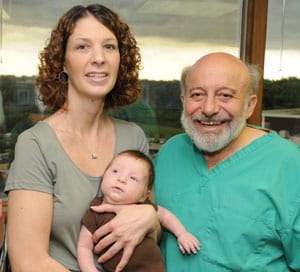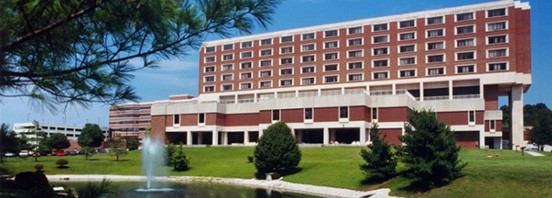
by Deborah Huso
AOL Health, October 29, 2010

When Amy Tucker of Columbia, Ill., gave birth [news video] to a healthy baby boy last May, she made headlines. The 32-year-old cancer survivor was no ordinary new mom. Thirteen years ago, when Tucker was diagnosed with Hodgkin’s lymphoma, she knew the cancer treatment would leave her infertile, so she elected to have one of her ovaries frozen for later re-implantation when she was cancer-free and ready to have kids.
The somewhat controversial procedure, conducted by Dr. Sherman Silber, director of the Infertility Center at St. Luke’s Hospital in St. Louis, came off without a hitch in Tucker’s case, making her the first cancer survivor in the U.S. to have a baby as a result of having an ovary frozen and re-implanted at a later time.
But freezing ovaries [news video] isn’t just for young women about to undergo fertility-destroying cancer treatments. In a recent presentation to the American Society for Reproductive Medicine in Denver, Silber told colleagues he felt ovary freezing offered a significantly more promising solution for infertility in older women than egg freezing. Silber told AOL Health that when a woman freezes eggs, she only gets about 10 or 15 eggs for each procedure, but with ovary freezing, she preserves 50,000 to 100,000 eggs, dramatically increasing her chances of pregnancy later in life.
“For cancer patients, we’ll take out the whole ovary,” says Silber, “but for young women looking to preserve fertility for later in life, we normally take out only a portion of the ovary. That way it won’t impact her current fertility.” So if a 30-year-old career woman planning to hold off on having children until she’s 40 meets “Mr. Right” at 32, changes her mind and decides to settle down, she can still have children naturally even if she’s had a portion of an ovary removed.
The St. Louis doctor believes it’s perfectly safe and extremely effective. He has frozen ovaries or portions of ovaries from 12 women in the last 14 years. Of those 12, all have resumed normal ovulation and menstruation, and 10 have had healthy babies. One experienced a miscarriage, and the other has yet to get pregnant. “We feel that’s a very robust procedure,” Silber says.
There have been 24 babies born worldwide as a result of ovary or ovarian tissue implants.
Silber says the procedure has another advantage beyond that of preserving female fertility into middle age. It also substantially decreases the risks of an older mom bearing a child with Down syndrome. He points out that if a woman has an ovary removed when she is 20 and then re-implanted when she’s 40, she’s working with 20-year-old eggs, as opposed to 40-year-old ones, and this would dramatically reduce her risk of Down syndrome.
The procedure, according to Silber, involves outpatient surgery for both the removal of the ovary or ovary tissue and for its re-implantation at a later date. He says it has no special risks beyond the normal risks associated with surgery and anesthesia.
Silber says women interested in ovary freezing should have their ovarian tissue removed by age 30 for best results.
See also:
